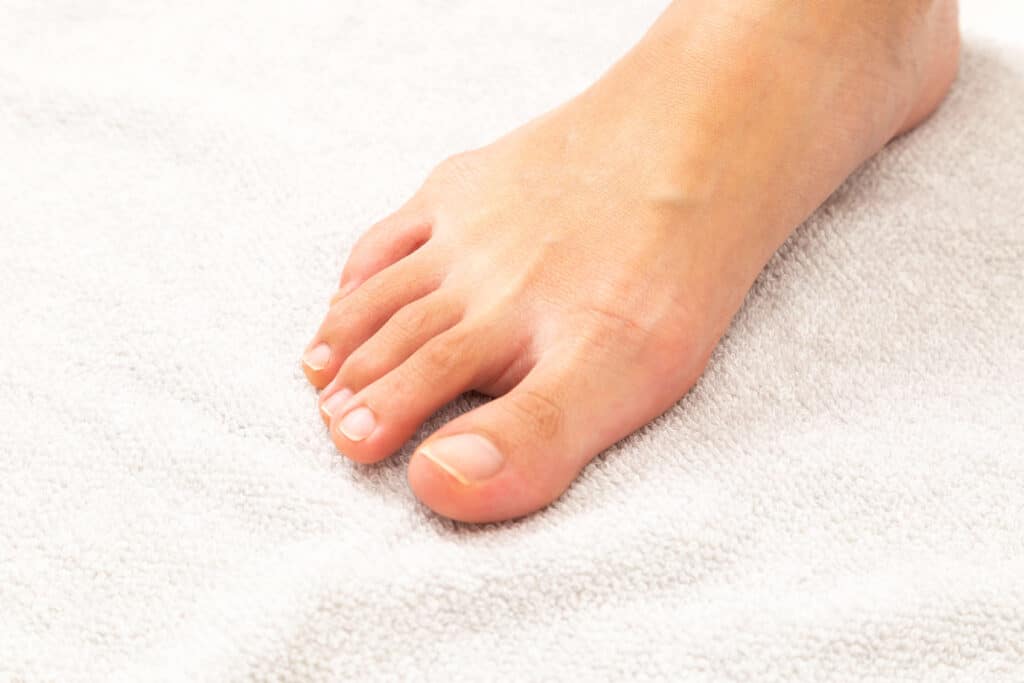Did you know that issues with toe joints and nerves can disrupt your entire day, from your morning walk to evening relaxation? Painful conditions like bunions, hammertoes, and neuromas affect millions of people each year, making simple tasks like walking, standing, and wearing shoes challenging.
Gaining insight into these conditions is the first step towards finding relief. In this blog, we’ll dive deep into what causes these common foot problems, their symptoms, and the best treatment options available, both at home and with professional help. Whether you’re dealing with a sharp pain in the ball of your foot, a swollen big toe joint, or a toe that’s stubbornly bent, this guide is here to help.
Bunion Overview
What Is a Bunion?
A bunion is a bony bump that develops at the base of the big toe, causing the joint to stick out and the big toe to lean toward the second toe. As the condition progresses, it often results in pain, swelling, and challenges in finding shoes that fit well.
Common Causes of Bunions
- Genetics: Bunions often run in families, as foot structure can be inherited.
- Improper Footwear: Narrow, tight, or high-heeled shoes can force the toes into unnatural positions, worsening the deformity.
- Unusual foot mechanics: Flat feet or overpronation can put extra stress on the big toe joint and contribute to the development of a bunion.
Symptoms of Bunions
- A pronounced bulge near the big toe joint
- Redness, swelling, and tenderness at the joint
- Discomfort that worsens with snug footwear or extended time on your feet
- Restricted movement of the big toe
Home Treatment Tips
- Bunion Pads: Cushion and protect the area from shoe pressure.
Ice Therapy: Apply ice packs to reduce swelling and inflammation. - Proper Footwear: Wear wide-toe box shoes with good arch support to reduce irritation.
When to See a Podiatrist
Persistent bunion pain, difficulty fitting into shoes, or interference with your everyday life are signs that it’s time to consult a podiatrist. Early evaluation can prevent worsening and may avoid surgery later.

Hammertoe Overview
What Is a Hammertoe?
A hammertoe develops when one of the smaller toes (often the second, third, or fourth) buckles at the middle joint, resembling a hammer. This condition can be flexible at first (meaning you can still straighten it), but may become rigid over time, making it difficult or impossible to move the toe.
Common Causes of Hammertoes
- Muscle Imbalances: Weakness or tightness in the foot muscles can pull the toe out of alignment.
- Poor-Fitting Shoes: Shoes that are too tight or too short can crowd the toes, encouraging deformity.
- Trauma or Arthritis: Injuries or inflammatory conditions can contribute to hammertoe development.
Symptoms of Hammertoes
- Pain at the top or tip of the affected toe
- Corns or calluses from shoe friction
- Swelling and redness around the joint
- Difficulty wearing closed-toe shoes
Home Treatment Tips
- Toe Pads: Reduce friction and cushion the bent toe.
- Deep-Toe Box Shoes: Provide extra space for the toes to lie flat.
- Toe Exercises: Gentle stretching can help maintain flexibility.
When to See a Podiatrist
Seek professional care if your hammertoe is painful, stiff, or interfering with daily activities. Early intervention can prevent worsening and may avoid surgery.
Neuroma Overview
What Is a Neuroma?
A neuroma, most commonly Morton’s neuroma, is a thickening of nerve tissue between the toes, typically between the third and fourth toes. This results from repeated irritation or compression of the nerve, leading to pain, tingling, and numbness in the forefoot.
Common Causes of Neuromas
- Biomechanical Issues: Flat feet and high arches can change the way your foot bears weight, putting more strain on the forefoot
- Tight Shoes: High heels or narrow-toe boxes compress the nerve.
- Trauma: Repeated stress, such as from running or certain sports, can irritate the nerve.
Symptoms of Neuromas
- Burning pain in the ball of the foot
- Tingling or numbness that radiates into the toes
- A persistent sensation that is similar to having a pebble or scrunched sock underfoot.
Home Treatment Tips
- Roomy, Cushioned Shoes: Reduce pressure on the nerve.
- Massage: Gently massage the forefoot to ease tension.
- Avoid High Heels: Choose low-heeled, supportive shoes.
When to See a Podiatrist
When home treatments don’t provide relief and numbness or pain escalates, professional podiatric evaluation is necessary. Early treatment can prevent nerve damage and help you stay active.
Diagnosis and Professional Treatment
Diagnostic Process
- Conduct a physical exam to check for deformities, tenderness, and movement.
- Use X-rays or ultrasound to assess joint alignment and rule out fractures or arthritis.
- Analyze your gait to identify pressure points and abnormal foot mechanics.
Non-Surgical Treatments
- Padding and Taping: Reduce pressure and align the toes properly.
- Medications: Anti-inflammatory drugs and cortisone injections can relieve pain and swelling.
- Physical Therapy: Guided exercises to improve foot muscle tone and promote greater flexibility.
- Custom Orthotics: Shoe inserts that support your foot’s natural structure and reduce stress on problem areas.
Surgical Options
If conservative treatments fail, surgery may be recommended:
- Bunion Surgery: Removes the bony bump and realigns the joint.
- Hammertoe Surgery: Straightens the toe by releasing tight tendons or fusing joints.
- Neuroma Surgery: Surgery aimed at taking out the thickened nerve causing pain.
Prevention Tips
Choose the Right Footwear
- Opt for shoes that offer plenty of space for your toes and provide solid arch support.
- Avoid high heels and narrow shoes that can crowd the toes.
Prioritize Foot Care
- Check your feet regularly for changes or pain.
- Keep skin moisturized and nails trimmed.
- Schedule annual podiatry check-ups to catch problems early.
Lifestyle Adjustments
- Maintain a healthy weight to reduce foot stress.
- Avoid repetitive activities that overstrain the toes.
- Use orthotics as recommended to support proper foot mechanics.
Conclusion
Toe joint and nerve conditions like bunions, hammertoes, and neuromas can disrupt your daily life, but early detection and treatment can help you stay active and pain-free.
Don’t let foot pain slow you down. Schedule an appointment with Dr. Yuko Miyazaki, your trusted podiatrist, for a comprehensive evaluation and personalized treatment plan.
Call 510-647-3744 or visit our Contact Page to book your appointment today!














